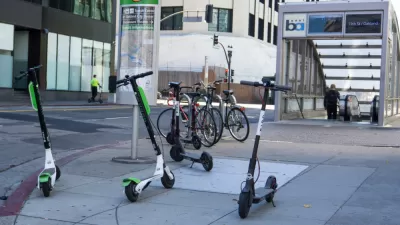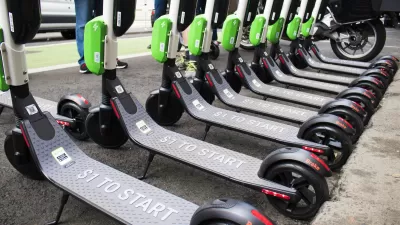Shared mobility services are proliferating in small towns and cities, despite the regulatory hiccups operators have been experiencing in larger markets.

“In recent months, shared micromobility companies like Bird, Lime and Lyft have rapidly expanded their products in small and midsized markets with populations ranging from 2,500 to over 150,000,” reports Austyn Gaffney in Smart Cities Dive. Despite the backlash to micromobility from some community groups concerned about safety and parking, industry stalwart Bird “grew from about 250 global markets last year to more than 400 this spring.”
“Cities have been amenable to micromobility options like e-bikes and e-scooters over the last five years as ways to increase residents’ and visitors’ transportation options, ease congestion, and reduce transportation emissions, which represent over a quarter of the greenhouse gas emissions in the U.S.” Meanwhile, operators continue to implement speed limiters, geofencing, and other features to address cities’ concerns. “Chris Cherry, professor of civil and environmental engineering at the University of Tennessee, Knoxville, whose research focuses on micromobility options emerging in the transportation sector, said that when he hears concerns over sidewalk clutter, he asks those issuing the complaint to consider the amount of parked cars across urban environments, and to note the historic buildings demolished to make way for parking lots.”
Pointing to fears about the safety of scooters, Cherry points out that the devices are held to much higher standards than cars, which pose a much greater danger to their passengers and pedestrians. Cherry notes that “while 80% of scooter users killed during rides were hit by cars, there is ‘vanishingly small evidence’ that pedestrian injuries are caused by scooters.”
FULL STORY: Micromobility operators expand their footprint in small and midsized cities

Planetizen Federal Action Tracker
A weekly monitor of how Trump’s orders and actions are impacting planners and planning in America.

Maui's Vacation Rental Debate Turns Ugly
Verbal attacks, misinformation campaigns and fistfights plague a high-stakes debate to convert thousands of vacation rentals into long-term housing.

Restaurant Patios Were a Pandemic Win — Why Were They so Hard to Keep?
Social distancing requirements and changes in travel patterns prompted cities to pilot new uses for street and sidewalk space. Then it got complicated.

In California Battle of Housing vs. Environment, Housing Just Won
A new state law significantly limits the power of CEQA, an environmental review law that served as a powerful tool for blocking new development.

Boulder Eliminates Parking Minimums Citywide
Officials estimate the cost of building a single underground parking space at up to $100,000.

Orange County, Florida Adopts Largest US “Sprawl Repair” Code
The ‘Orange Code’ seeks to rectify decades of sprawl-inducing, car-oriented development.
Urban Design for Planners 1: Software Tools
This six-course series explores essential urban design concepts using open source software and equips planners with the tools they need to participate fully in the urban design process.
Planning for Universal Design
Learn the tools for implementing Universal Design in planning regulations.
Heyer Gruel & Associates PA
JM Goldson LLC
Custer County Colorado
City of Camden Redevelopment Agency
City of Astoria
Transportation Research & Education Center (TREC) at Portland State University
Jefferson Parish Government
Camden Redevelopment Agency
City of Claremont





























